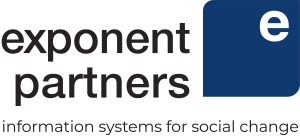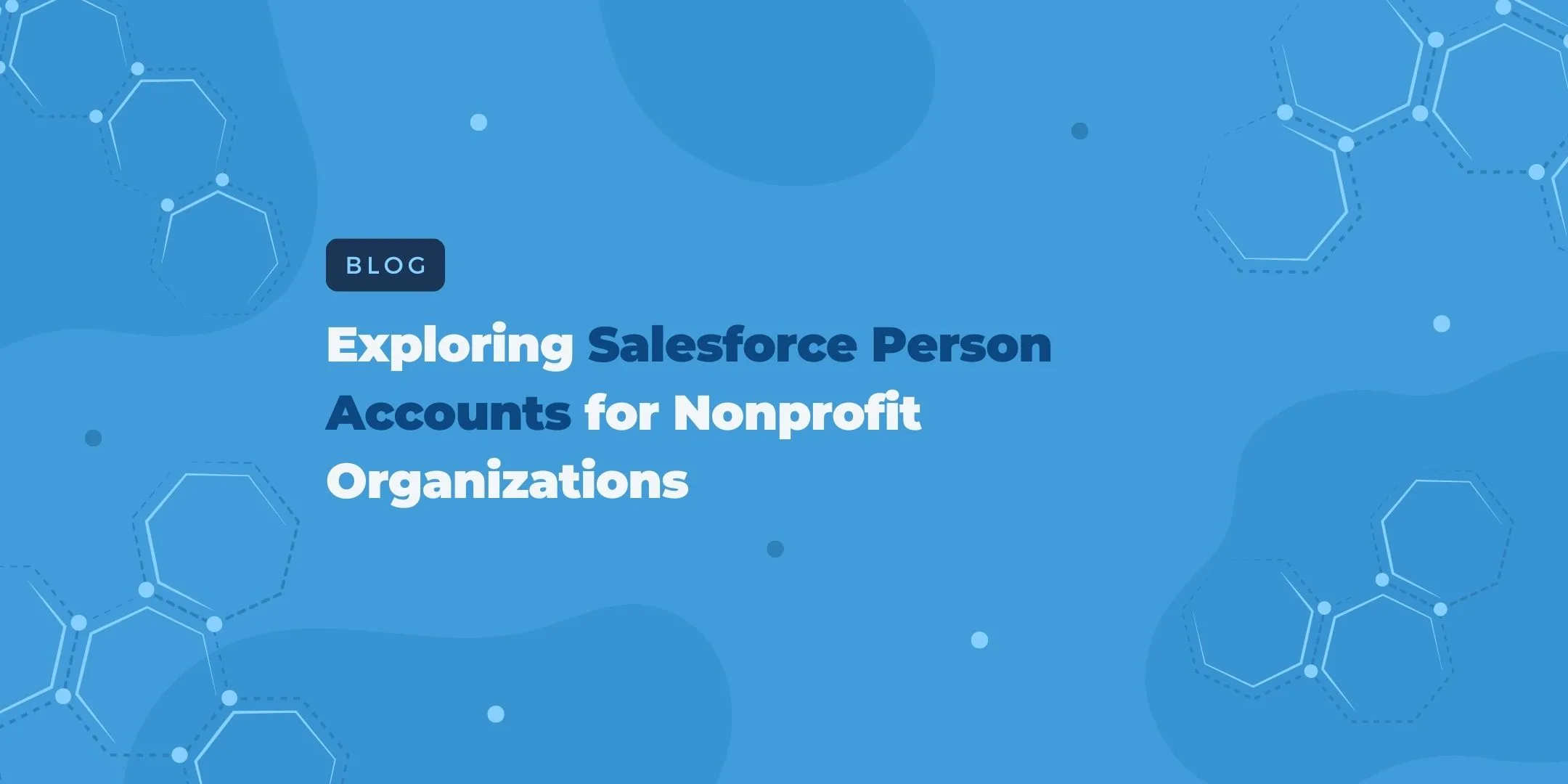Exploring Salesforce Person Accounts for Nonprofit Organizations
Exploring Salesforce Person Accounts for Nonprofit Organizations
Up until the Spring ‘23 announcement of Salesforce’s new Nonprofit Cloud, nonprofits have been relying on managed packages to efficiently organize and manage nonprofit relationships.
The new Nonprofit Cloud, designed specifically for nonprofit organizations, provides specific functionalities and features that surpass existing solutions in this sector—such as the Nonprofit Success Pack (NPSP).
One of the significant changes in moving from the NPSP to the Salesforce Nonprofit Cloud is the inclusion of person accounts as a core capability. This account model allows organizations to better:
- Enhance relationship management
- Analyze data comprehensively
- Streamline operations
- Align with nonprofit industry best practices
- And more deeply personalize stakeholder experience
Whether you’re planning to migrate to Nonprofit Cloud or continue using your current solution with person accounts—this article’s for you. In the following sections, we’ll delve deeper into Salesforce person accounts and how nonprofits can use them to enhance case management and drive organizational success.
What Is a Person Account in Salesforce?
Person accounts in Salesforce are a type of record that represents an individual rather than a business or organization. They help nonprofit organizations better track and manage their interactions with donors, volunteers, and other stakeholders.
They offer an alternative option to Salesforce’s traditional business accounts, which focus primarily on the business or organization—with all contacts needing to be linked to an organization or household account.
The Benefits of Using Salesforce Person Accounts
Person accounts can create contacts without attaching them to a business. This helps users store contacts within Salesforce without needing to connect them to an existing organization account.
Individuals can be quickly added to the system and flexibly treated as both accounts and contacts, meaning organizations can easily track information like donation history, volunteer activities, and more.
Person accounts give nonprofits a 360-degree view of their constituents, making it easier to understand their needs, preferences, and engagement patterns. This information can also be used to personalize communications with each constituent with tailored messaging, targeted appeals, and customized program offerings.
Important Considerations When Using Salesforce Person Accounts
No tech solutions come without potential challenges, and Salesforce Person Accounts are no different. These are the key considerations outlined by the Salesforce team when it comes to adopting person accounts:
- Once enabled, you can’t disable person accounts.
- The storage required for a person account is more than that of a business account
- Some AppExchange products don’t work well with person accounts, so check AppExchange first to make sure the product is compatible with person accounts.
- Person Accounts are supported in Marketing Cloud, Account Engagement, and Experience Cloud but require additional configuration.
How Are Person Accounts Different from Other Account Models in Salesforce?
In order to understand how person accounts differ, it’s essential to know how Salesforce relates objects to one another. The different types of accounts in Salesforce enable different relationship objects on the platform.
Relationship objects are used to create connections between different types of records, such as accounts, contacts, and opportunities. They allow nonprofit organizations to track and manage complex relationships between donors, volunteers, and other stakeholders.
For example, a relationship object could be used to link a donor account with a volunteer opportunity or to connect a board member with a specific program or initiative.
There are several types of account models other than person accounts, let’s take a look:
| What are they? | How do they differ from person accounts? | |
| Individual accounts | Optional account model for NPSP. Creates one account record and links all contacts to that account | Compared to individual accounts, person accounts are more suitable when maintaining a large number of contact records because they combine individual and account data for better user experience. |
| 1-1 accounts | Optional account model for NPSP. Links an account record to each contact created | 1-1 accounts provide a high-level view of organizations instead of granular information at an individual level, which is provided by person accounts. |
| Household accounts | Default account model for NPSP. A business account that represents a group of related individuals, such as a family or a corporation | Household Accounts represent a group of related individuals, while person accounts represent a single individual. With Household Accounts, all individuals have a household created automatically. |
| Party accounts | Preferred account model for the new Nonprofit Cloud. Represents a company or organization | Party accounts store information about organizations and their relationships to individual contacts and person accounts store information about individuals. |
It’s important to note that a collection of party accounts is known as a party relationship group. It is used to group together individuals or organizations that have a common relationship to a nonprofit organization like members of a household or family support system, members of a board of directors, or members of a volunteer committee.
Party relationship groups allow users to manage relationships between multiple party accounts via a single record. This can be useful for tracking and analyzing data on groups of constituents, such as donations or volunteer activities for a particular committee or household.
This functionality is similar to that of ARCs.
What Is the Actionable Relationship Center (ARC)?
The Actionable Relationship Center (ARC) is also included within Salesforce Nonprofit Cloud. The ARC helps users understand relationships among people and businesses by presenting them in interactive display components.
This model brings the relationships between the record being viewed and the associated records and parties to life. This means that users get an entire view of an individual on a page to track the party model, related records, action plans, and programs in a single mapped interface. This real-time data is interactive and enables nonprofits to get a complete overview of a project and the relationships it involves.
Use Cases For Person Accounts
A few important use cases for Salesforce Nonprofit Cloud person accounts include the following:
Donor Management
Nonprofit organizations can use person accounts to track individual donors, their contributions, giving history, and engagements with the organization. This data can be used to personalize donor stewardship, run targeted fundraising campaigns, and cultivate long-term relationships.
Volunteer Management
Person accounts can help manage individual volunteers, their skills, availability, and activities. Volunteers can be matched with the right opportunities, their hours tracked, and their contributions recognized. This makes the volunteer management aspect of nonprofit organizations a whole lot easier.
Managing Program Participants
Use person accounts to manage participants of various programs and services. It can help track program enrollment, progress, outcomes, and any additional support provided. This goes a long way in evaluating program effectiveness and delivering personalized support.
Track Event Attendees
Track individuals attending nonprofit events, including conferences, fundraisers, and community gatherings with person accounts. The account model allows for efficient event registration, personalized communication, and post-event follow-up.
Advocacy And Engagement Management
Person accounts can support users in managing individual advocates and their engagement in various campaigns. Use the account model to track advocacy actions, responses, and impact, helping nonprofits mobilize supporters and measure overall advocacy effectiveness.
The flexibility and customization of person accounts go a long way in allowing nonprofits to tailor their use for specific engagement and relationship management needs. This leads to stronger connections with every party involved.
Ready To Use Salesforce Person Accounts? Exponent Partners Can Help
Person accounts have significantly changed how you can handle account management in Salesforce. The process is more streamlined and efficient, alleviating common issues other account types face. It has also enabled organizations to experience other long-term benefits, such as:
- Building stronger relationships with donors
- Increased engagement with volunteers
- An overall positive experience for constituents
- Target outreach efforts and generate more funds
- Identify patterns in donor behaviors to increase donor retention
- Track and report the impact of programs and initiatives
It’s because of these reasons that you should leverage the capabilities of person accounts to lead your nonprofit on a path to success. And we at Exponent Partners can help with that.
We are a team of experts who can help you optimize Salesforce setup for your nonprofit organization. With our services, you can ensure that you are focused on what you do best—driving significant impact in the world.
Schedule a call to find out how we can help you take nonprofit management and organization to the next level and continue delivering personalized impact in the communities you support.

